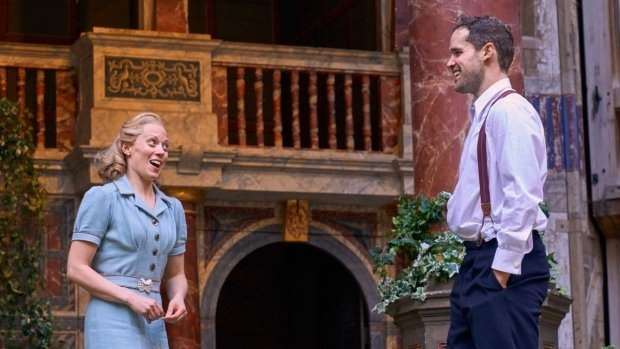Much Ado About Nothing at Shakespeare's Globe – review
The production launches the Globe’s 25th anniversary season

© Manuel Harlan
Entering the "Wooden O" for this, the Globe's first main stage production of the year, is to be transported to a rural Italian garden, complete with creeping vines, grassy walkways and an ornate fountain, and populated by women sporting elegant 1940s fashions. By setting it just before the end of World War Two, immediately prior to the Allied forces liberating Italy, director Lucy Bailey creates a uniquely female-driven Much Ado, where these women – soignée but pragmatic – have kept the home fires burning while awaiting news of the ongoing war, and where there is an expectation that they remain models of purity and submission when the men return. The bond between them, and how that contrasts with the camaraderie of the returning soldiers adds an intriguing tension to this most beloved of Shakespeare's comedies.
Elderly nobleman Leonato, owner of the country estate of the setting (designed by Joanna Parker), is now Leonata (Katy Stephens), a somewhat camp and unexpectedly randy society grand dame, and her sibling Antonio, parent of heroine Beatrice, has become the eccentric, perpetually gardening, Antonia (Joanne Howarth), eavesdropping disapprovingly as she brandishes pruning shears or her massive wheelbarrow like they're weapons. So magnificent are Stephens and Howarth in these reminted roles that one forgets that they're usually played by men.
There are other surprises too: Lucy Phelps's scintillating Beatrice delivers her famous "there was a star danced, and under that I was born" line not as the usual little brag of triumph, but with a stifled sob, suggesting that under all her wit there's a well of untapped emotions. When Patrick Osborne's Claudio turns on Hero (a winning Nadi Kemp-Sayfi, sparkier than many of her predecessors in the role) his rage and disappointment are almost too painful to watch, and Ferdy Roberts finds a real, haunting desolation and loneliness in the heroic Don Pedro.
Ultimately though, this is a comedy and a hugely satisfying one at that. The darker interpretation here of some aspects of the text serves to throw the funny stuff into such relief that it soars. George Fouracres as a manically gormless Dogberry is a particular comic delight, as is the inspired pairing of Stephens and Howarth as the thoroughbred matrons who need little encouragement to shake off the shackles of decorum and launch into a musical interlude of almost operatic excess.
The chemistry between Phelps's Beatrice and the adorably awkward Benedick of Ralph Davis is so palpable from the outset that a real charge runs through the audience when they finally get together. It helps that they're both such likeable stage presences, with very specific and vivid takes on these two familiar characters. Phelps captures Beatrice's fierce intelligence but also an innate kindness and vulnerability. She is also a superb physical comedian.
Davis gives us a Benedick whose thought processes we can almost see, with the face of a sullen cherub, beautiful comic timing, and an air of diffidence that gets thoroughly fractured by the force of his feelings. It's a glorious performance.
The doubling up of some roles is a bit confusing, and the second half slightly runs out of steam, but this is still a cracking start to the Globe's 2022 season and sets the bar high ahead of the National's production later in the summer. This Much Ado About Nothing is as sparkling and heady as an extra dry prosecco: it's a real treat.













